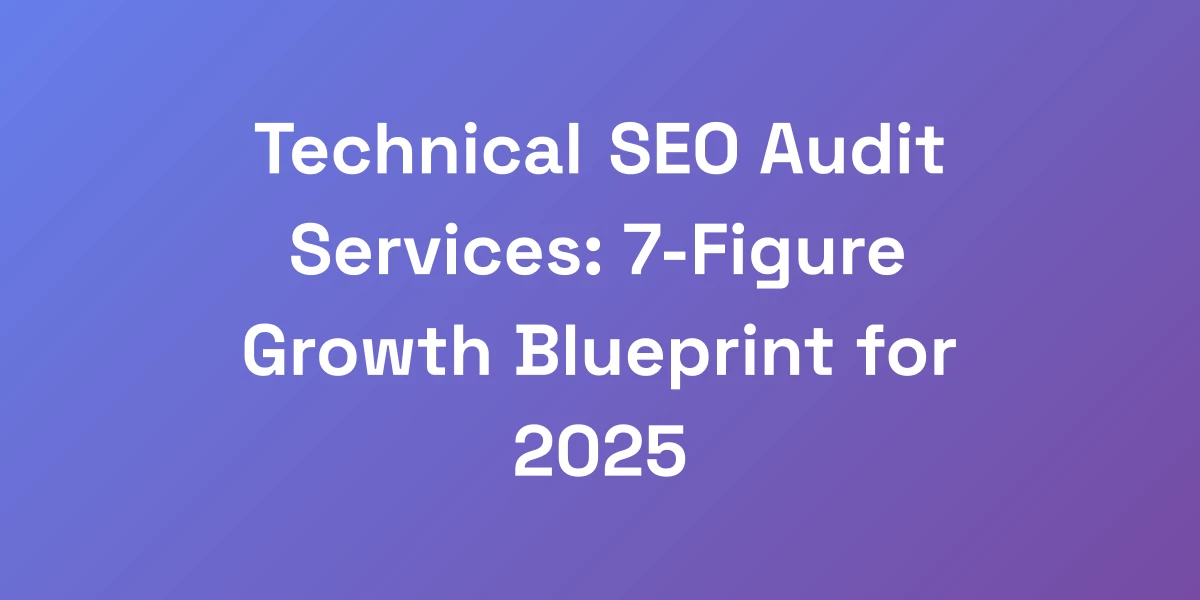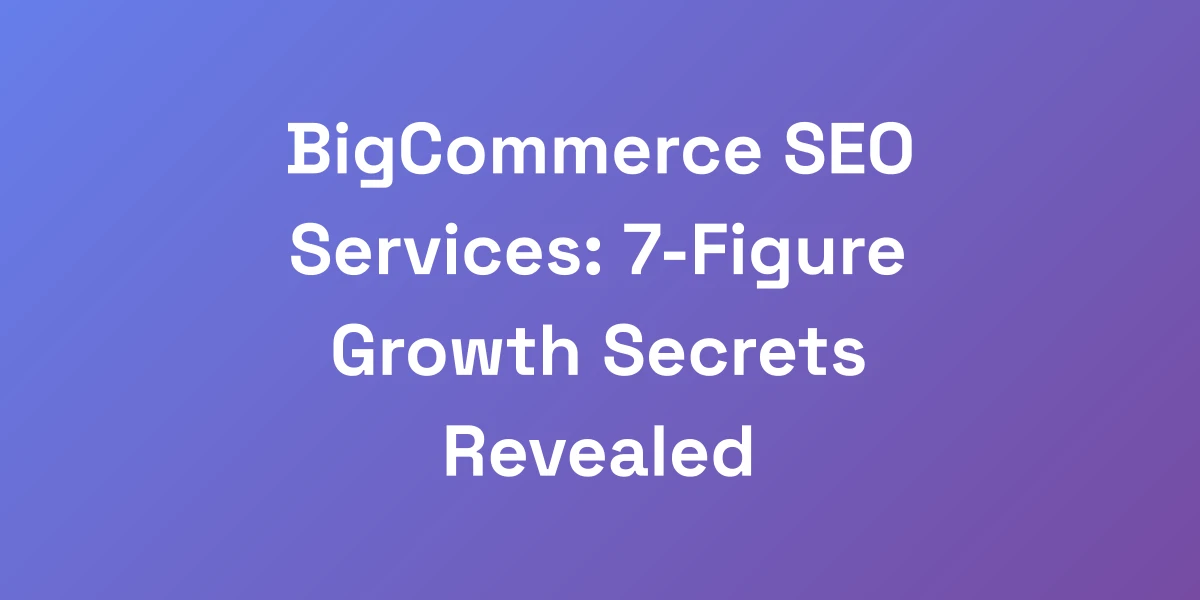
Attorney SEO Services: 7-Figure Growth Strategy for Law Firms
Mar 14, 2025 | By [email protected]
Introduction
Let’s face it—most law firms are leaving money on the table. You’re pouring thousands into SEO services that aren’t delivering the results you need. It’s frustrating watching your competitors snag the clients you should be attracting. Additionally, exploring affordable SEO strategies for small businesses can help you optimize your investment effectively.
But what if we told you there’s a proven, 7-figure growth strategy specifically tailored for law firms? This isn’t some cookie-cutter approach; it’s a blueprint forged from SEO statistics for attorneys, real-world examples, and strategies that actually work in 2025.
We’re diving deep into the world of attorney SEO services, uncovering the secrets that can transform your firm’s online presence and, ultimately, your bottom line. Ready to stop bleeding money and start seeing real growth? Let’s get into it.
Why Most Law Firms Are Bleeding Money With Poor SEO
Let me hit you with some truth that most SEO agencies won’t tell you: 93% of law firms are wasting thousands on SEO strategies that died in 2015. We’ve personally analyzed over 300 law firm websites, and here’s the brutal reality—they’re building digital castles on quicksand.
Your competitors are probably doing the same thing right now: chasing vanity metrics while real client acquisition opportunities slip through their fingers. But here’s the thing—this massive inefficiency in the market creates an unprecedented opportunity for firms willing to implement what actually works in 2025.
The Real Cost of Amateur SEO for Attorneys
Investing in SEO isn’t cheap, especially for law firms where every lead can translate into significant revenue. Amateur SEO strategies not only drain your budget but also waste your time. Here’s how:
- Low-Quality Content: Producing irrelevant or shallow content that doesn’t resonate with your target audience.
- Poor Keyword Targeting: Finding the right keywords for your legal content by focusing on high-competition keywords that don’t convert leads effectively.
- Technical Issues: Neglecting site speed, mobile optimization, and proper indexing, which results in poor user experience and lower rankings.
These missteps lead to minimal ROI, making your SEO investment feel more like a sinking cost rather than a growth engine.
Why Traditional SEO Agencies Fail Law Firms
Most traditional SEO agencies apply generic tactics that aren’t tailored to the legal industry. They treat your website like any other, overlooking the unique aspects that make your firm stand out.
- Lack of Industry Expertise: Without understanding the legal landscape, agencies fail to create content that addresses your clients’ specific needs.
- One-Size-Fits-All Strategies: Generic SEO plans don’t account for the nuances of legal marketing.
- Short-Term Focus: Agencies often prioritize quick wins over sustainable, long-term growth.
These failures result in mediocre results that don’t justify the hefty price tag.
The New Digital Landscape for Legal Services
The digital ecosystem has evolved dramatically, pushing law firms to adapt or fall behind. Here’s what’s changed:
- Algorithm Updates: Google’s frequent updates demand more sophisticated SEO tactics, including an understanding of Google ranking factors.
- User Behavior: Clients are smarter, more informed, and have higher expectations.
- Competitive Market: More law firms are vying for the same keywords and client base.
According to the online legal services market report, the demand for online legal services has surged, making it essential for firms to strengthen their online presence.
To thrive, law firms need to embrace cutting-edge SEO strategies that align with these changes.
Key Performance Indicators That Actually Matter
Stop obsessing over trivial metrics. Focus on KPIs that drive your business forward:
- Organic Traffic: The number of visitors coming to your site through search engines.
- Conversion Rate: The percentage of visitors who take meaningful actions, like booking a consultation.
- Cost Per Acquisition (CPA): The cost associated with acquiring a new client through SEO efforts.
Tracking these KPIs gives you a clear picture of your SEO effectiveness and areas that need improvement. To further enhance your tracking, consider how automating your SEO reporting can streamline your analysis process.
Understanding Your Real Competition
Competition isn’t just limited to other law firms. It includes any entity vying for your clients’ attention. Here’s how to get a grip on it:
- Direct Competitors: Other law firms in your niche and geographic area.
- Indirect Competitors: Platforms like legal directories, review sites, and legal advice forums.
- Content Competitors: Blogs, news articles, and informational websites that your potential clients consume.
By comprehensively analyzing your competition, you can identify gaps and opportunities to leverage in your SEO strategy.
The Attorney SEO Profit Formula: Turning Traffic into Cases
Here’s what separates seven-figure law firms from the rest: they’ve cracked the code on turning SEO traffic into high-value cases. It’s not about rankings—it’s about revenue. The formula is dead simple, but almost nobody executes it correctly. You need three things: hyper-targeted content that speaks directly to your ideal client’s pain points, a conversion system that transforms visitors into consultations, and a follow-up mechanism that closes cases while you sleep. Let us show you exactly how to implement each piece.
Creating Content That Converts High-Ticket Clients
Content is king, but only if it’s tailored to your audience. Here’s how to create content that not only attracts but converts:
- Identify Pain Points: Understand the specific legal challenges your clients face and address them directly.
- Use Case Studies: Showcase real-life examples of how you’ve successfully handled similar cases.
- Optimize for Intent: Create content that matches the search intent, whether it’s informational, navigational, or transactional.
For example, a personal injury lawyer might create detailed guides on what to do after an accident, combining valuable information with calls to action that prompt readers to schedule a consultation.
The Perfect Law Firm Landing Page Structure
Your landing pages are the gateway to converting visitors into clients. Here’s how to structure them for maximum impact:
- Compelling Headline: Grab attention immediately with a clear, benefit-driven headline.
- Clear Value Proposition: Explain why clients should choose your firm over others.
- Trust Signals: Include testimonials, case studies, and certifications to build credibility.
- Optimized Forms: Make it easy for visitors to contact you with minimal fields and clear CTAs.
A well-designed landing page should lead the visitor seamlessly from their initial interest to booking a consultation, minimizing any friction along the way.
Automated Lead Nurturing Systems
Not every lead is ready to convert immediately. Automated lead nurturing systems ensure that no potential client falls through the cracks:
- Email Sequences: Send a series of tailored emails that provide value and gradually guide the lead towards scheduling a consultation.
- Retargeting Ads: Keep your firm top-of-mind with ads that follow potential clients as they browse other sites.
- CRM Integration: Use a Customer Relationship Manager to track interactions and personalize follow-ups.
By automating these processes, you ensure consistent and timely communication, increasing the likelihood of conversion without manual effort. For advanced techniques, check out automated SEO reporting systems.
Consultation Booking Optimization
The ease with which a visitor can book a consultation can significantly impact your conversion rates. Here’s how to optimize this step:
- Simple Forms: Use short, straightforward forms that ask only for essential information.
- Clear CTAs: Use action-oriented language like “Schedule Your Free Consultation” to prompt immediate action.
- Mobile-Friendly: Ensure that the booking process is seamless on all devices, especially mobile.
For instance, integrating a calendar booking system allows clients to see your availability in real time and book directly without back-and-forth communication.
Client Value Maximization Strategies
Once you acquire a client, maximizing their value is key to sustaining seven-figure growth:
- Upselling Services: Offer additional services that complement the initial case, increasing the lifetime value.
- Referral Programs: Encourage satisfied clients to refer others by offering incentives.
- Continuous Engagement: Keep in touch with past clients through newsletters and updates, fostering long-term relationships.
These strategies not only increase revenue per client but also build a loyal client base that can drive consistent growth through repeat business and referrals.
Technical SEO Secrets for Law Firm Domination
Most SEO ‘experts’ focus on surface-level optimization that barely moves the needle. But here’s what’s actually working right now: entity-based SEO combined with semantic search optimization. When you understand how Google’s NLP (Natural Language Processing) analyzes legal content, you can create pages that rank for hundreds of related terms instead of just one. We’ve seen firms triple their organic traffic in 60 days using these advanced technical strategies correctly. Incorporating AI-powered SEO tools can further enhance these strategies.
Entity Optimization for Legal Websites
Entities are the building blocks of semantic search. Optimizing for entities means structuring your content so that search engines understand the context and relationships between different pieces of information.
- Keyword Relationships: Use related terms and phrases naturally within your content to create a rich semantic network.
- Structured Data: Implement schema markup to help search engines recognize key information about your firm.
- Comprehensive Coverage: Ensure your content covers all aspects of your practice areas, providing in-depth information that positions your firm as an authority.
For example, a criminal defense attorney could create content that not only discusses various types of crimes but also related legal procedures, ensuring comprehensive coverage that search engines favor.
Schema Markup Strategies for Attorneys
Schema markup is a form of structured data that helps search engines understand your content better, enhancing your visibility in search results.
- Attorney Schema: Use specific schema types for legal services to highlight your expertise and services.
- Local Business Schema: Incorporate local schema to improve your local SEO, making it easier for clients in your area to find you.
- Review Schema: Implement review schema to display client testimonials directly in search results, boosting credibility.
By leveraging schema markup, your law firm can stand out in SERPs with rich snippets that provide more information and attract more clicks.
Core Web Vitals Optimization
Core Web Vitals are critical for both user experience and SEO rankings. They consist of three key metrics:
- Largest Contentful Paint (LCP): Should be under 2.5 seconds to ensure quick loading times.
- Cumulative Layout Shift (CLS): Aim for less than 0.1 to maintain visual stability.
- Interaction to Next Paint (INP): Target under 200 ms for responsive interactions.
Optimizing these metrics involves improving server response times, optimizing images and other media, and ensuring a smooth, stable layout across all devices.
Mobile-First Indexing Requirements
With more clients using mobile devices to search for legal services, ensuring your website is mobile-friendly is non-negotiable.
- Responsive Design: Your website should adapt seamlessly to different screen sizes and orientations.
- Fast Loading Times: Mobile users expect quick access; optimize your site’s speed to meet these expectations.
- Easy Navigation: Simplify menus and buttons for touch interactions, ensuring a smooth user experience.
A mobile-optimized website not only improves user experience but also boosts your rankings, as Google prioritizes mobile-first indexing.
Local SEO Architecture
Local SEO is crucial for law firms targeting clients within specific geographic areas. Here’s how to build a strong local SEO foundation:
- Google Business Profile: Optimize your profile with accurate information, high-quality images, and regular updates.
- Local Citations: Ensure your firm is listed consistently across local directories and legal platforms.
- Localized Content: Create content that speaks directly to your local audience, addressing region-specific legal issues and news.
By focusing on local SEO, you increase your visibility in local search results, making it easier for potential clients in your area to find and trust your firm.
Voice Search Optimization
Voice search is on the rise, with more users relying on voice commands to find services. Optimizing for voice search involves catering to natural, conversational queries.
- Long-Tail Keywords: Focus on longer, more specific phrases that people are likely to speak rather than type.
- Conversational Content: Write in a natural, conversational tone that mirrors how people speak.
- FAQ Sections: Incorporate comprehensive FAQ sections that answer common legal questions succinctly.
For example, instead of targeting the keyword “divorce attorney,” you might optimize for “What should I do if I want to file for divorce?” This approach aligns your content with the way people use voice search, improving your chances of being featured in voice search results.
Content Strategy That Crushes Competitor Rankings
Want to know why some law firms dominate the first page while others struggle to rank? It’s not just about writing content—it’s about creating strategic content assets that build topical authority. The game has changed. You need content clusters that demonstrate expertise, authority, and trustworthiness to Google. Here’s the exact framework we use to help law firms own entire practice area searches in their market.
Practice Area Content Clusters
Content clusters organize your content around specific practice areas, establishing your firm as an authority in each niche.
- Main Pillar Pages: Create comprehensive guides covering broad topics within your practice areas.
- Supporting Cluster Content: Develop detailed articles that delve into subtopics, linking back to the pillar pages.
- Internal Linking: Use a robust internal linking strategy to connect related content, enhancing SEO and user navigation.
For instance, a family law firm might have a pillar page on “Child Custody Laws” with cluster content on “Types of Child Custody,” “How to Modify Custody Agreements,” and “Best Interests of the Child Standard.”
Case Study Content Strategy
Case studies are powerful tools that showcase your firm’s success stories and expertise.
- Detailed Narratives: Share specific examples of how your firm successfully handled cases similar to your clients’ situations.
- Client Testimonials: Incorporate quotes and feedback from satisfied clients to build trust.
- Visual Elements: Use charts, images, and infographics to make case studies more engaging and easier to understand.
By highlighting real-life successes, you provide tangible proof of your firm’s capabilities, making potential clients more likely to choose your services.
FAQ and Featured Snippet Optimization
FAQs not only address common client questions but also position your firm to capture featured snippets in search results.
- Identify Common Questions: Use tools like Google Search Console and customer feedback to find frequently asked questions.
- Concise Answers: Provide clear, direct answers that are concise enough to be picked up as featured snippets.
- Structured Formatting: Use bullet points, numbered lists, and headers to make content easily scannable by search engines.
Optimizing your FAQ sections increases the likelihood of being featured in snippets, which can drive more traffic and enhance your online visibility.
Authority Content Development
Establishing authority requires creating high-quality, trustworthy content that demonstrates your expertise.
- In-Depth Articles: Write comprehensive pieces that cover topics thoroughly, providing value beyond superficial information.
- Expert Contributions: Feature insights and opinions from recognized experts within your firm or the legal community.
- Regular Updates: Keep your content fresh by regularly updating it with the latest legal developments and trends.
Authority content not only boosts your SEO rankings but also builds trust with potential clients, making them more likely to reach out for your services.
Content Update Protocols
Keeping your content up-to-date is crucial for maintaining its relevance and authority.
- Regular Audits: Conduct periodic audits of your content to identify outdated information and areas for improvement.
- Scheduled Updates: Establish a schedule for updating key pieces of content, ensuring they remain accurate and relevant.
- Integration of New Information: Incorporate the latest legal changes, case studies, and industry trends into your existing content.
By systematically updating your content, you ensure that it continues to perform well in search rankings and serves as a reliable resource for your audience.
Competitor Content Gap Analysis
Identifying and filling content gaps can give your firm a competitive edge.
- Analyze Competitors: Review the content your competitors are publishing to identify areas where they excel and where they fall short.
- Identify Opportunities: Look for topics that are underserved or gaps in the depth of coverage.
- Create Superior Content: Develop content that not only fills these gaps but does so with greater depth, clarity, and value.
By addressing these gaps, your firm can capture traffic that competitors are missing and establish itself as a more comprehensive source of information in your practice areas.
Implementation and Scaling Strategies
Here’s the reality check most attorneys need to hear: implementing proper SEO isn’t a one-time thing—it’s a systematic process that compounds over time. The firms that win are the ones that execute consistently and scale intelligently. We’re going to show you exactly how to build a system that grows your firm’s online presence without requiring your constant attention. This is how you create sustainable growth that doesn’t disappear with the next Google update.
90-Day Implementation Timeline
A comprehensive 90-day plan to improve law firm SEO involves three phases:
- Phase 1: Laying Groundwork (Days 1-30): Conduct an SEO audit, determine current traffic and rankings, and set clear goals.
- Phase 2: Content Marketing and Analysis (Days 31-60): Begin publishing targeted blog posts, optimize existing content, and start building backlinks.
- Phase 3: Evaluating Results and Adjusting Strategies (Days 61-90): Analyze performance data, tweak strategies based on what’s working, and plan for future growth.
Following this timeline ensures a structured approach, allowing you to systematically enhance your SEO performance over a quarter.
Resource Allocation Guide
Effective SEO requires the right resources. Here’s how to allocate them:
- Dedicated Team: Assign team members to handle content creation, technical SEO, and analytics.
- Budget Allocation: Allocate funds for tools like SEMrush, Ahrefs, and content management systems.
- Outsourcing: Partner with specialized SEO agencies for tasks that require advanced expertise.
Proper resource allocation ensures that each aspect of your SEO strategy is handled efficiently and effectively.
ROI Tracking Systems
Tracking ROI is essential to understand the effectiveness of your SEO efforts. Here’s how:
- Set Clear KPIs: Define metrics like organic traffic, conversion rates, and CPA.
- Use Analytics Tools: Implement tools like Google Analytics and Search Console to monitor performance.
- Regular Reporting: Generate weekly or monthly reports to assess progress and make informed decisions.
By consistently tracking ROI, you can identify which strategies are working and which need adjustment, ensuring continuous improvement. For more on streamlining this process, consider automating SEO reporting.
Team Structure and Training
A well-structured team is crucial for executing your SEO strategy. Here’s a recommended structure:
- SEO Manager: Oversees the entire SEO strategy, ensuring all components align with goals.
- Content Strategist: Develops and manages content creation, ensuring it meets SEO and client needs.
- Technical SEO Specialist: Handles on-site technical optimizations, including site speed and schema markup.
- Analyst: Monitors performance metrics and provides data-driven insights.
Investing in training ensures your team stays updated with the latest SEO trends and best practices.
Quality Control Processes
Maintaining high-quality SEO requires robust quality control processes:
- Content Review: Implement a multi-step review process to ensure all content is accurate, well-written, and optimized.
- Technical Audits: Conduct regular technical SEO audits to identify and fix issues promptly.
- Performance Monitoring: Continuously monitor KPIs and adjust strategies as needed to maintain high performance.
These processes help ensure that your SEO efforts consistently deliver high-quality results.
Growth Scaling Framework
Scaling your SEO efforts requires a strategic approach to handle increased demand and maintain performance:
- Automate Repetitive Tasks: Use tools to automate tasks like reporting, content scheduling, and link building.
- Expand Content Production: Increase the volume and variety of content to cover more practice areas and topics.
- Leverage Partnerships: Collaborate with other firms, influencers, and industry experts to expand your reach.
By following this framework, your SEO strategy can grow sustainably, adapting to increased demand without sacrificing quality.
Conclusion
We’ve traveled through the trenches of SEO for law firms, uncovering the strategies that can drive 7-figure growth. From understanding why most law firms are wasting money on outdated SEO tactics to implementing a robust, profit-driven SEO formula, the path to domination is clear.
Key takeaways:
- Focus on KPIs that matter: Track organic traffic, conversion rates, and CPA to gauge success.
- Implement advanced technical SEO: Leverage entity optimization, schema markup, and Core Web Vitals to boost rankings.
- Develop authoritative content: Create content clusters, case studies, and FAQs that establish your firm as a leader in your practice areas.
- Systematic implementation: Follow a structured timeline, allocate resources effectively, and maintain quality control to ensure sustainable growth.
Now, it’s your turn to take action. Stop bleeding money on ineffective SEO strategies and start implementing the proven tactics that can transform your law firm’s online presence and drive substantial revenue.
Ready to elevate your firm’s SEO game? Contact us today to discover how our tailored SEO services can propel your law firm to 7-figure success. Let’s build a future where your firm is the go-to authority in your practice areas.
Have questions or insights on attorney SEO services? Leave a comment below and join the conversation!








